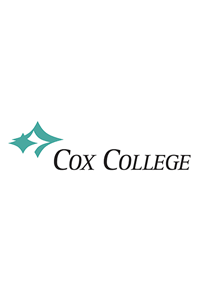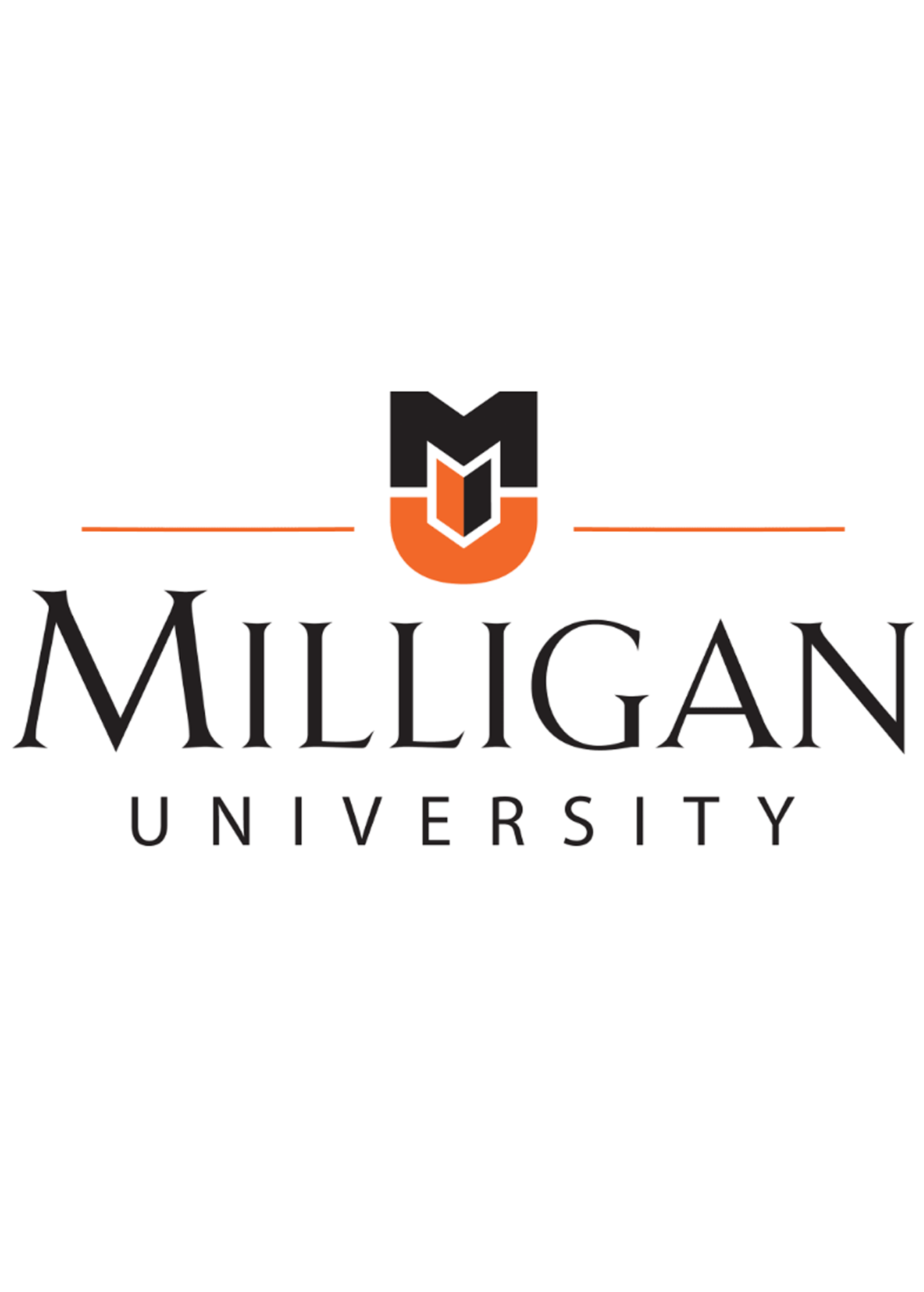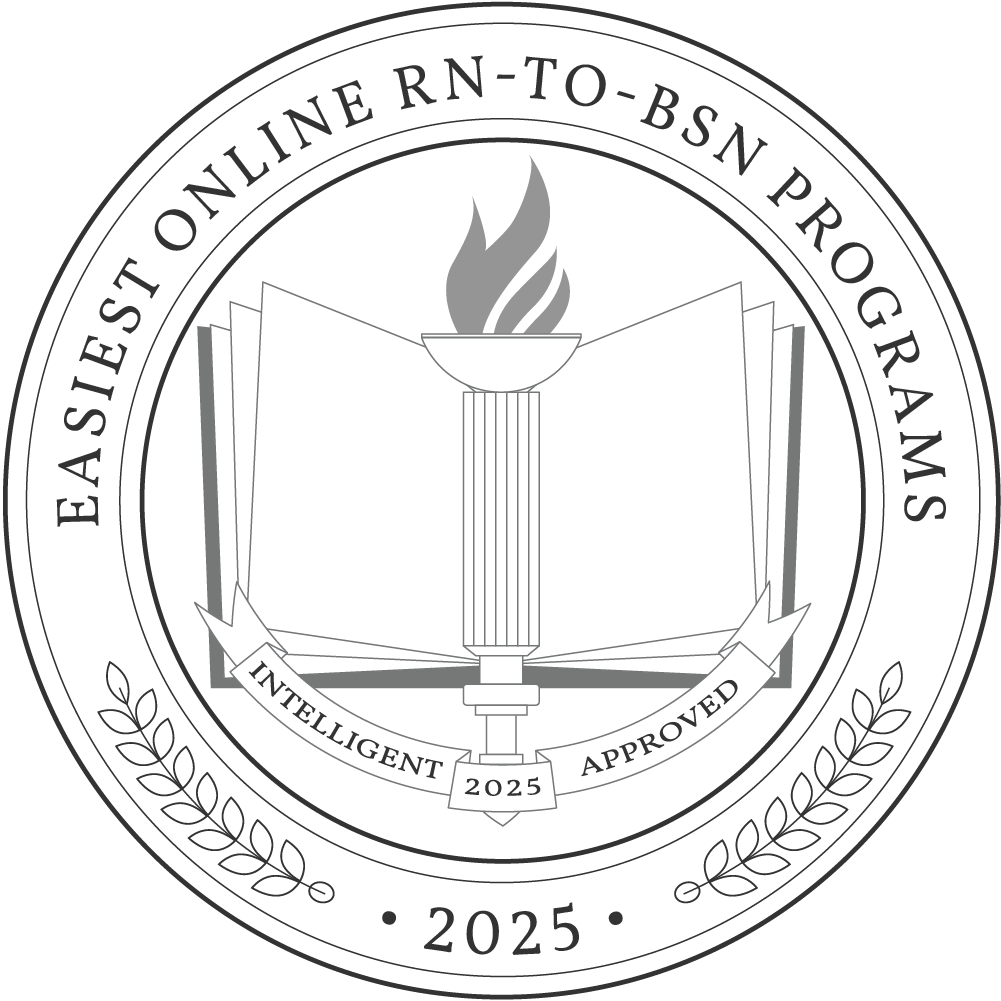Registered nurses with a Bachelor of Science in Nursing (BSN) degree have better access to leadership positions and career advancement than those whose highest education level is an associate’s degree or nursing school diploma. However, earning a BSN requires a commitment of time and energy, which can be challenging for those who are currently working or handling other life responsibilities.
To help RNs find an RN-to-BSN degree program that fits into their schedule, Intelligent.com compiled this list of the easiest online RN-to-BSN programs based on factors like flexibility, curriculum and clinical requirements, and transfer credit policies. We also spoke to Blanca Villagomez, a program coordinator and counselor at UC-Irvine, for answers to frequently asked questions about online RN-to-BSN degree programs.
Why Trust Us
The Intelligent.com Higher Education Team is dedicated to providing students with independent, equitable school and program rankings and well-researched resources. Our expert-driven articles cover topics related to online colleges and programs, paying for school, and career outlooks. We use data from the U.S. Department of Education’s College Scorecard, the National Center for Education Statistics, and other reputable educational and professional organizations. Our academic advisory team reviews content and verifies accuracy throughout the year for the most current information. Partnerships do not influence rankings or editorial decisions.
- Analyzed over 2,000 national, accredited, and nonprofit colleges and universities
- 800+ rankings pages are reviewed and updated yearly
- Content is informed by reputable sources, surveys, and interviews with academic advisors and other experts
- Over 100 data points are reviewed for accuracy and quality throughout the year, including sources
How we rank schools
Our list features the Easiest Online RN-To-BSN degree programs at top colleges nationwide. Each school featured is a nonprofit, accredited institution — either public or private — with a high standard of academic quality for post-secondary institutions.
We evaluated each school’s program on tuition costs, admission, retention and graduation rates, faculty, reputation, and the student resources provided for online students. We collected data from trusted sources like the National Center for Education Statistics, individual school and program websites, school admissions counselors, and other data sources. Then, we calculated the Intelligent Score on a scale of 0 to 100 based on the following criterion:
Academic Quality:
- Admission rate versus enrollment rate
- Retention rate of students who return after year one
- Accreditation status (regional and programmatic)
- Nonprofit status, both private and public institutions
Graduation Rate
- Overall graduation rate
- Total number of currently enrolled students, including diversity metrics
- Student-to-faculty ratio
Cost and ROI
- In-state and out-of-state per-credit tuition rates and fees
- Required credits to graduate
- Earning potential after graduation
- Availability of federal student loans, scholarships, and other financial aid options
Student Resources
- Available student services for online-only and hybrid programs
- On-campus amenities like tutoring centers and the number of libraries
Read more about our ranking methodology.
Best 27 Easiest Online RN to BSN Programs
FiltersInstitution Type
Status
- Intelligent Score
- Alphabetically By University Name
- Acceptance Rate
- Enrollment
- In-state Graduate Tuition
- Out-of-state Graduate Tuition
- In-state Undergraduate Tuition
- Out-of-state Undergraduate Tuition

Cox College
Intelligent Score: 97.9In-state: $34,377
Out-of-state: $34,377
In-state: $32,375
Out-of-state: $32,375
SAT: 860 or higher
ACT: 18 or higher
$435
Online
Commission on Collegiate Nursing Education
120

Mississippi University for Women
Intelligent Score: 97.86In-state: $7,425
Out-of-state: $7,425
In-state: $7,425
Out-of-state: $7,425
SAT: 990-1300
ACT: 19-24
$212- $337
Online
Commission on Collegiate Nursing Education
128.0

Delta State University
Intelligent Score: 97.43In-state: $7,951
Out-of-state: $7,951
In-state: $7,951
Out-of-state: $7,951
SAT: 885-1125
ACT: 18-23
$221- $351
Online
Commission on Collegiate Nursing Education
120.0

Lewis-Clark State College
Intelligent Score: 93.54In-state: NA
Out-of-state: NA
In-state: NA
Out-of-state: NA
SAT: 870-1110
ACT: 17-22
$389
Online
Commission on Collegiate Nursing Education
120

University of Maine at Fort Kent
Intelligent Score: 93.33In-state: $9,240
Out-of-state: $30,030
In-state: $8,298
Out-of-state: $8,298
SAT: N/A
ACT: N/A
$309
Online
Commission on Collegiate Nursing Education
120

The University of Texas at El Paso
Intelligent Score: 92.21In-state: $11,448
Out-of-state: $40,032
In-state: $12,028
Out-of-state: $12,028
SAT: 1210-1470
ACT: 26-33
$336
Online
Commission on Collegiate Nursing Education
120

Western Governors University
Intelligent Score: 89.56In-state: $6,380
Out-of-state: $6,380
In-state: $7,500
Out-of-state: $7,500
SAT: N/A
ACT: N/A
$390
Online, On-Campus
Commission on Collegiate Nursing Education
120

Milligan University
Intelligent Score: 89.15In-state: $34,150
Out-of-state: $34,150
In-state: $8,755
Out-of-state: $8,755
SAT: 1080-1270
ACT: 22-27
$1,075
Online
Commission on Collegiate Nursing Education
128

University of Providence
Intelligent Score: 88.82In-state: $26,462
Out-of-state: $26,462
In-state: $31,500
Out-of-state: $31,500
SAT: 830-1010
ACT: 16-23
$978
Online
Commission on Collegiate Nursing Education
120

Arkansas Tech University
Intelligent Score: 88.79In-state: $5,568
Out-of-state: $11,136
In-state: $5,256
Out-of-state: $5,256
SAT: N/A
ACT: N/A
In-State: $249
Out-of-State: $499
Online
Accreditation Commission for Education in Nursing
120.0

Eastern Kentucky University
Intelligent Score: 88.72In-state: $9,266
Out-of-state: $19,338
In-state: $9,900
Out-of-state: $9,900
SAT: 950-1170
ACT: 19-25
$479
Online
Commission on Collegiate Nursing Education
120

Shepherd University
Intelligent Score: 87.97In-state: $5,790
Out-of-state: $15,276
In-state: $8,118
Out-of-state: $8,118
SAT: N/A
ACT: N/A
In-State: $262
Out-of-State: $657
Hybrid
Commission on Collegiate Nursing Education
120.0

Keiser University
Intelligent Score: 87.93In-state: $19,808
Out-of-state: $19,808
In-state: $27,162
Out-of-state: $27,162
SAT: N/A
ACT: N/A
$980 - $1,470
Online, On-Campus
Commission on Collegiate Nursing Education
120.0

Liberty University
Intelligent Score: 85.61In-state: $14,791
Out-of-state: $14,791
In-state: $7,935
Out-of-state: $7,935
SAT: 1040-1250
ACT: 21-29
$390
Online
Commission on Collegiate Nursing Education
120

Southeastern Louisiana University
Intelligent Score: 85.41In-state: $5,777
Out-of-state: $18,255
In-state: $6,684
Out-of-state: $6,684
SAT: N/A
ACT: 19-24
$240
Online
Commission on Collegiate Nursing Education
120

Auburn University at Montgomery
Intelligent Score: 84.44In-state: $10,080
Out-of-state: $30,240
In-state: $10,080
Out-of-state: $10,080
SAT: 1160-1320
ACT: 25-31
Resident: $368
Non-Resident: $825
Online
Commission on Collegiate Nursing Education
120

D'Youville University
Intelligent Score: 84.36In-state: $27,986
Out-of-state: $27,986
In-state: $18,522
Out-of-state: $18,522
SAT: 960-1150
ACT: 19-24
$425
Online
Commission on Collegiate Nursing Education
122

College of Coastal Georgia
Intelligent Score: 84.14In-state: NA
Out-of-state: NA
In-state: NA
Out-of-state: NA
SAT: 900-1100
ACT: 16-22
In-State: $106
Out-of-State: $394
Online
Accreditation Commission for Education in Nursing
120.0
Is an Online RN-to-BSN Degree Program Right For You?
An RN-to-BSN program is a completion program for registered nurses who have a diploma or associate degree in nursing from an accredited college and would like to earn their bachelor’s degree in nursing. Exact parameters vary by program, but in most cases, students can transfer up to 90 credits from previous postsecondary education, allowing them to earn their bachelor’s degree faster than they would in a traditional program.
Before selecting an online RN-to-BSN degree program, students should consider what “easy” means to them. For some students, this may mean a flexible, asynchronous program that allows them to complete assignments and lessons according to their own schedule without regular class meetings. In other cases, students may need the consistent support of faculty and classmates that a synchronous program with virtual class meetings provides.
Students who are seeking an easy program from a curricular perspective should note that RN-to-BSN degree programs typically cover intermediate and advanced nursing skills and practices, including research, health promotion, patient care technology, and safety and quality within the healthcare system. Nurses, especially those who hold a BSN, are expected to be proficient in the technical aspects of nursing, which requires time, energy, and commitment.
How To Find an Easy Online RN-To-BSN Program
Here are some of the factors to take into account when searching for the program that fits your needs:
Transfer credit policies
Ideally, you’ll be able to find a program that accepts as many of your previous classes as possible toward your credit total. This will reduce the number of credits you need to take, making the program both easier and more cost-effective.
Every institution has its own rules regarding the acceptance of previous credits. It’s important to review your transcripts with an admissions counselor who is knowledgeable about transfer policies to get a clear understanding of how many previously earned credits your new school will accept. You can also find out if the school where you earned your ADN or nursing diploma has articulation agreements with any four-year colleges that offer BSN degrees, as this can facilitate a smooth transition.
Many RN-to-BSN degree programs will accept credits from foundational nursing courses, such as anatomy and physiology or nursing leadership. Because bachelor’s degrees also require general education courses, your RN-to-BSN program may also accept credits for courses in areas like the humanities, math, and physical or social sciences.
RN-to-BSN degree programs are designed to get students into advanced nursing courses as quickly as possible, so the more previous coursework you can transfer to a new institution, the easier it will be to complete your BSN degree.
Clinical requirements
Clinical education is an integral part of nursing training. Because RN-to-BSN degree programs acknowledge that students already have nursing licensure and experience, they may have few or no clinical rotation requirements. They may also allow students to complete clinical requirements at their regular nursing jobs.
Keep in mind that the number of clinical hours a student must complete for a BSN is mandated by your school and state licensing board. If you cannot provide proof of past clinical experience, you may need to fulfill this requirement to earn your BSN.
Students in online RN-to-BSN degree programs can typically complete clinical requirements at a local medical facility or hospital, even if your school is not located in the same area. You will work with your professors and other staff members at your school and at possible placement sites to determine the best way for you to complete this requirement.
When researching potential programs, speak to an admissions counselor or program representative to clarify what constitutes clinical experience and what proof you need to submit to show that you have completed it. Programs with low or no clinical experience requirements can make it easier to complete your RN-to-BSN.
Competency-based learning
Many online degree programs follow a competency-based learning model, in which students progress through their program by passing an assessment or test to demonstrate their competency in a subject.
For example, RNs with experience working in a NICU may be able to easily pass a competency-based course on how to care for newborns in intensive care units based on real-life experience. With these types of programs, students don’t need to spend time re-learning skills they already know.
Some RN-to-BSN degree programs are specially set up on a competency-based model, while others may award credit on a case-by-case basis. If you’re unsure about whether you can receive credit for existing competencies, speak to a program representative to determine if this is an option in your program.
Doing so may save you time and money on your program, allowing you to check off required courses without spending hours in the classroom studying a subject with which you are already familiar.
The Pass-Fail Problem
When selecting an easy online RN-to-BSN degree program, it’s important to take note of the kind of grading system the program uses. Many of the easiest RN-to-BSN programs make it simple for students by using a pass-fail grading system rather than a traditional tiered letter system. As long as these programs are offered by an accredited institution, this is an acceptable way to earn your BSN.
However, students who aspire to earn a master’s degree in nursing or a related field should note that advanced nursing degree programs typically do not accept credits from pass-fail courses. These programs usually have a minimum GPA requirement for applicants, and those who can’t demonstrate that they meet the GPA threshold may not be eligible for admission.
If you are considering continuing your education past your BSN, your best option is to choose a program that offers letter grades along with a numerical GPA based on those grades. Maintaining a GPA of 3.0 or higher in your BSN program is usually a prerequisite for admission into graduate-level nursing programs.
Online RN-to-BSN Degree Programs Frequently Asked Questions
Should I get a RN-to-BSN degree online or in person?
Deciding whether to earn an RN-to-BSN degree in-person or online is a personal choice based on preferences and priorities.
“When comparing both types of programs, it can be helpful to weigh the pros and cons of each option and consider factors such as your field of study, learning style, budget, and career goals,” Villagomez says. “Flexibility is one key factor to consider, as online programs can be ideal for students who are balancing multiple commitments, such as work or caregiving, because they often allow students to study at their own pace, according to their own schedule.”
However, online learning may not work for all students. “Students should also consider what environments help them learn best,” Villagomez says. “Those who learn better through group work or hands-on projects may find in-person programs a better fit.”
She adds, “All online degree programs require high self-motivation, effective time management, and structured independent study.” Students should determine if they are prepared for the necessary accountability that comes with online learning before committing to an online RN-to-BSN degree.
How do I apply to an online RN-to-BSN program?
“After researching degree programs and schools, students should have a strong sense of the admission requirements,” Villagomez says. “Because requirements usually vary by school, students need to stay organized with a comprehensive and detailed checklist to track their progress, submit all required materials, and meet deadlines.”
An active RN license is a standard requirement for RN-to-BSN degree programs. Some programs may also require that students have professional nursing experience and a minimum GPA in their ADN or diploma program.
Beyond these eligibility requirements, a standard application for an RN-to-BSN degree includes:
- Completed application and required fees
- Official transcripts from previously attended colleges
- Letters of recommendation
- Personal statement or essay
- Resume or CV
- SAT or ACT scores
Students should also be mindful of application deadlines, especially for programs that only enroll new students once or twice per academic year.
How much does an online RN-to-BSN degree program cost?
The cost of an online RN-to-BSN degree will vary by school and program. The best way to get accurate cost information is by speaking to a financial aid counselor at the schools you’re considering.
According to the National Center for Education Statistics (NCES), during the 2022-23 academic year, the average annual tuition for undergraduate programs was $9,750 at public institutions and $38,421 at private colleges.
Many factors influence how much students will pay for an online RN-to-BSN degree. For example, students attending a public institution should note whether the school has different tuition rates for in-state and out-of-state students or if distance learners all pay the same tuition rate. Many schools charge additional fees for virtual classroom technology, labs, background checks, or other resources, which students must factor into their budgets.
However, because these programs are geared towards students who are already working as nurses, it may be easier to maintain a job and steady income while enrolled.
How long does it take to earn an online RN-to-BSN degree?
Program duration for an RN-to-BSN degree varies based on the required number of credits and the student’s enrollment status. Programs that require 120 credits can typically be completed in four years of full-time study or 5-6 years of part-time study.
Students who have previously earned credits from an associate degree or diploma program can typically apply those credits to their BSN, decreasing the overall amount of time it takes to complete their BSN degree. These are commonly known as degree completion programs and can help students earn their BSN faster.
Is an online RN-to-BSN degree worth it?
“Earning an online nursing degree can be a convenient and flexible way to pursue higher education,” Villagomez says. “However, the value of an online degree can depend on various factors, such as the reputation of the school and the program, student support services, the accreditation of the degree, and the specific career or educational path students are pursuing.”
From a career perspective, the demand for nurses is expected to continue steadily through the next decade. This is driven by an increase in the elderly population and a need to replace RNs who retire, switch careers, or move to advanced positions. The BLS reports that there will be an average of 194,500 new openings for RNs every year through 2032.
RNs with a BSN can also expect a higher salary, although this is also determined in part by setting and location. The ANA reports that the average annual salary for RNs with a BSN is $92,000, compared to $75,000 for those with an ADN.
Students should also consider changes in the industry to address pay inequities. In recent years, nurses and healthcare workers throughout the U.S. have taken action, including striking, to demand better pay and working conditions amid changes in the healthcare industry.


